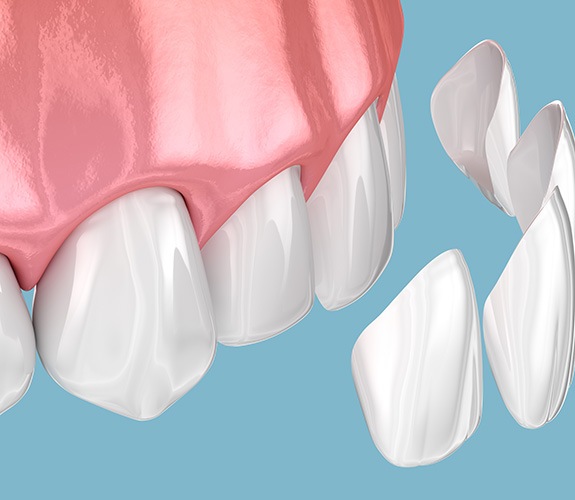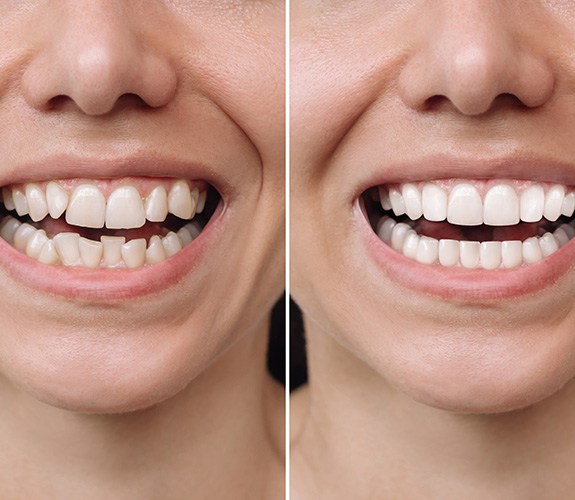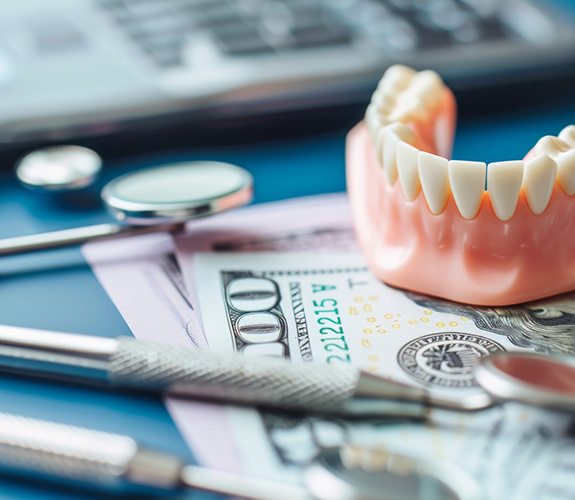
The cosmetic dentists at Grand Dental – Naperville offer custom-made veneers for patients suffering from major smile imperfections. Capable of concealing an array of flaws, including chips, cracks, stains, gaps, misshapen teeth, minor misalignment, and discoloration, veneers produce transformational results that benefit a patient’s physical, mental, and emotional well-being. To find out if you are a candidate for this type of cosmetic treatment, call our office today to schedule a consultation.
Why Choose Grand Dental - Naperville for Veneers?
- Customized Restorations for Each Dental Patient
- Flexible Financing for Cosmetic Dental Treatment
- Cosmetic Dentists with Years of Advanced Training

What are Veneers?
Veneers are thin coverings that are custom-made to conceal imperfections that exist on the front-facing surfaces of teeth. As permanent restorations that require the removal of a small portion of tooth enamel for proper adherence, they can be placed in two visits and last a decade or longer with proper care. Veneers are known to be stain-resistant and durable against daily wear and tear.

The Process of Getting Veneers
Veneer placement begins with a patient meeting with one of our cosmetic dentists for a consultation. If cleared to receive treatment, the first appointment will include a member of our team using a shade guide to determine the desired color for the veneers. Once selected, we will remove a small portion of tooth enamel from each treated tooth, creating a surface that is conducive for the bonding agent that will be used to attach the veneer.
Impressions will then be taken to produce a model of the patient’s teeth so that lab technicians can begin to fabricate the restorations based on the specifications and details provided by our team.
The patient will then receive temporary veneers to wear between appointments, making it possible for the individual to experience life with these custom restorations. After a few weeks, we will have the patient return to our office to have their temporary veneers removed before their permanent ones are put in place.

The Benefits of Veneers
Enhancing one’s smile with custom veneers has many advantages, such as:
- Restorations that can last a decade or longer with the right level of care
- Restorations that are stain-resistant and can stand up to normal wear and tear
- Restorations that can be placed in two appointments for quicker results
- Restorations that generate greater confidence and a more youthful aesthetic
- Restorations that conceal many different flaws, making it highly versatile

Understanding the Cost of Veneers
Our cosmetic dentists at Grand Dental – Naperville cannot determine the cost of veneers until a patient comes to see us for a consultation. There are too many factors that must be considered before providing an individual with an estimate for treatment, such as the number of veneers needed, whether preliminary services are required, and the material used to craft custom veneers. Our team will review the proposed estimate with the individual and discuss ways to lower any out-of-pocket costs.
Veneers FAQs
Are veneers permanent?
Although they’re often promoted as permanent cosmetic restorations, this is not entirely true. They do require replacement after several years; however, the process of receiving veneers is irreversible. The reason is that a small bit of tooth enamel must be removed to ensure proper adherence to the veneer and the tooth. Since enamel cannot grow back, it’s necessary for veneers to cover this area for the remainder of one’s life.
What happens to the teeth under veneers?
Veneers only cover the front-facing surfaces of teeth, so all other areas of teeth are exposed. This means that while veneers cannot develop decay, the areas they do not cover certainly can. A person must practice good oral hygiene while wearing veneers – brushing and flossing are essential. This removes decay, stains, and food debris that can break down enamel and cause cavities. Also, it’s best for a person to stay away from sugar-heavy foods while making sure to see a member of our team for six-month dental checkups and cleanings.
Will I be able to drink coffee with veneers?
Veneers are considered to be stain-resistant, which means that because they’re made of porcelain and not porous tooth enamel, they’re unlikely to discolor. However, it’s important to note that they are not stain-proof. Over time, the more coffee a person drinks, the greater the risk of staining one’s veneers. Moderation is key when it comes to dark-colored beverages, especially if the individual wants to get the most out of their investment.
How long do veneers last?
There are various studies that point to the longevity of veneers. According to one performed in 2007, out of 304 veneers by Layton, 96% lasted around five years and 73% lasted 15-16 years. A 2012 study found that of the 318 veneers by Beier, 95% lasted five years and 83% lasted about 20 years.
If one or more veneers fail, it’s likely because of damage (i.e., chip, crack, fracture), which can occur if teeth are not properly protected. The average lifespan for veneers is 10-15 years; however, they can last as long as 30 years if they’re taken care of. A person can do this by adopting good at-home oral hygiene, seeing their dentist regularly, and staying away from unhealthy habits, like biting down on hard objects.
